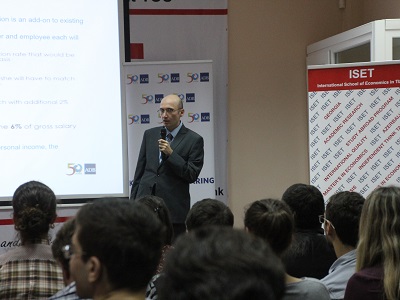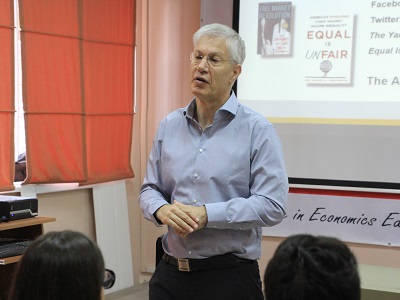- Details
On Monday, October 9th, ISET hosted George Luarsabishvili, Economist at the Georgia Resident Mission of the Asian Development Bank. Mr. Luarsabishvili made a presentation on Pension Reform in Georgia.
Mr. Luarsabishvili first reviewed the current pension system of the country, existing challenges, and the rationale of the reform. He then discussed the details of pension reform in Georgia. The government of Georgia intends to introduce a multi-pillar pension system based on an occupational defined contribution pension, as an add-on to the existing zero pillar, with support from development partners, including ADB, starting in 2018. The objective of the reform is to restructure the existing pension system so that it helps prevent poverty for senior citizens, is affordable for both individuals and society, and is sustainable in the long-term. The reform introduces a supplemental contributory pension savings pillar to provide additional pension income and a more adequate replacement rate, while universal social pensions will become mainly a poverty alleviation tool.
- Details
On September 7, ISET hosted the president and executive chairman of the Ayn Rand Institute, Dr. Yaron Brook, for a presentation. The topic of the presentation was Free Speech and The Battle for Western Culture. During the presentation, Dr. Brook explained why and in what ways free speech is under attack and why it is important to defend this fundamental right.
At the beginning of the presentation, Dr. Brook highlighted that free speech is a core value of civilization, and is what Western civilization stands for. One of the most important events in the history of civilization was the adoption of the Declaration of Human Rights, the first political document that recognizes human rights. However, he claimed that there has been years is an obvious restriction of free speech in recent years: Newspapers cannot publish cartoons relevant to the news, just because they fear violent reprisals; Dr. Brook also claimed there were even greater restrictions of free speech at universities, which cannot invite speakers if the guests do not hold common political views.












